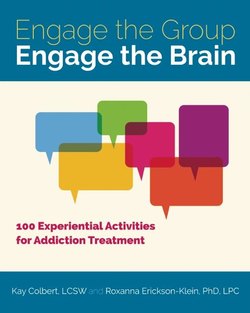Читать книгу Engage the Group, Engage the Brain - Kay Colbert - Страница 8
На сайте Литреса книга снята с продажи.
ОглавлениеPreface
We met four years ago in an inpatient recovery setting. Kay, a Licensed Clinical Social Worker, was a member of the counseling staff and brought to the position an interest in mindful meditation. Roxanna, a Registered Nurse finishing a counseling internship, brought familiarity with clinical hypnosis and an orientation of participatory engagement. We were drawn together by our mutual interest in using experiential activities. This interest led us to develop a small notebook of ideas that we shared with other staff members about activities we had used successfully with groups. The more we worked, the more we became aware of the limitations of resource materials available for our client population. To assure we had a broad base of choices for our own use, we compiled a core collection of therapeutic activities focused on recovery skills. We sought qualitative input through scales, surveys, and discussion with other facilitators and the clients themselves. Feedback was incorporated into the activity designs. Our considerable efforts to amass a collection of useful materials eventually evolved into this book. We do not claim that all these activities are unique creations by us. Many were inspired by other sources that we modified, adapted, and updated. We have done our best to credit our inspirational bases and reference them as appropriate. What makes this collection particularly valuable is that we have tried and tested each of the activities and modified them as needed for ease of use and clarity of purpose.
The facility where we did most of our work is Nexus Recovery Center in Dallas, Texas, a well-respected, nonprofit inpatient facility that offers harbor and hope for women with active substance abuse concerns and mental health issues. Nexus is one of the few drug treatment facilities in the country that accepts pregnant women. The Nexus program uses a structured schedule, builds acceptance of personal responsibilities, and utilizes process groups, educational groups, and individual counseling. When working with groups there is the challenge, not unique to this program, to engage clients in active participation and to capture their attention in meaningful ways.
Nexus incorporates a cognitive behavioral approach and embraces twelve-step methodology, which is similar to the majority of programs offered in the United States. The center uses the broadly accepted Stages of Change model, delineated by Prochaska, Norcross, and DiClemente. Clients’ readiness for change is assessed on admission, and progress is encouraged in the direction of preparation, action, and maintenance. Most of the women who spend time at Nexus have made a commitment to sobriety and enter the program while in a preparation or action phase of change. Despite the brevity of the voluntary program, the residents generally express deep appreciation for the opportunity to redirect their lives and show promising behavioral changes with insight into their addictive patterns. A structured outpatient program is offered for integrated follow-up with discharge plans that include twelve-step work, referrals for counseling, medical and mental health services, job training, and educational and housing assistance as needed.
All the activities in this book were primarily tested on clients at Nexus Recovery Center, and some of the activities were tested in other local centers. In each case, if an activity did not go smoothly, it was modified and retried. Some of the activities were additionally tested with other types of groups. It is expected that many of the activities will be useful to a broad range of individuals who can benefit from self-awareness skills, not just those in recovery from substance abuse. It is anticipated that the activities have adaptability to settings of various orientations and groups of various sizes or skill levels.
Philosophically, we present a model for self-healing designed for clients to take with them and use for ongoing support in recovery. The experiential process offers what Ernest Rossi and Kathryn Rossi in their book, Creating New Consciousness in Everyday Life: The Psycho-Social Genomics of Self Creation, (see Introduction) call self-generating creative moments that facilitate new consciousness.
